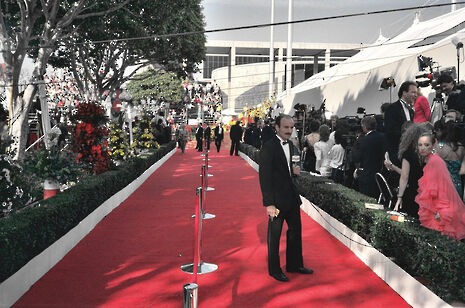The Oscars: What’s the opposite of diversity?
Naomi Eva Obeng questions representation, the Academy and what we can do about it

Did you hear that? The hushed whispers and clacking of keys? The nominations list has been read. Preparations for Hollywood’s showcase have begun. Of course it’s not just Hollywood, there’s a foreign language category too!
It has not escaped the attention of major newspapers that this year’s Oscar nominees are the least diverse bunch of creatives to have been printed onto its hallowed envelopes in years.
Moments before the nominees were revealed it had seemed completely impossible for the British actor David Oyelowo not to get a nod for his portrayal of Dr Martin Luther King, Jr. in Selma. He was in all the papers’ pre-Oscar predictions and Brad Pitt even gave a master-class on how to pronounce his name – something Lupita Nyong’o took upon herself before her best supporting actress win last year. It turns out that David Oyelowo isn’t Oscar-worthy after all. Apparently. Well, if members of the public cannot predict who will and who won’t receive a shiny statue at a televised ceremony in California next month, then what on earth is the point of it all?
I’ll take the liberty of breaking down the highly uniform nominees for you, don’t blame me if you get bored: all nominees for direction, cinematography, writing and visual effects are male (that’s 25 men, 0 women), all nominated best pictures have a male protagonist (by the way, Selma is a town in Alabama, not a woman), all best leading and supporting actors and actresses are white (that’s 20 talented Caucasians), the animated feature makers are all male and there is one man nominated for costume design (good on you Mark Bridges).
When all this transpired, debate was raging in publications, glances firing and mugs of coffee no doubt being poured from heavily subsidised percolators. “Is it because there isn’t enough diversity in films?” (there isn’t), “Is it because there is a gender bias in film production?” (there is) “Is it because of who is voting?” (yes)… I wonder if Neil Patrick Harris is going to sing.’(I hope so!).
That’s just it. There is a whole host of reasons that does not stop at the Academy. It starts with society and the sunny money-making industry that only values the voices of a particular group of people. Diversity is natural, the opposite of diversity takes quite some prejudiced effort to achieve. Is it really surprising that a corporate industry built on stories about western post-colonial male existence, via jazz hands and computer generated explosions, has managed to produce nominations for actors that do not include a single person of colour? Or that out of the 428 nominees for best direction since the ceremony’s inception in 1927 there have only been 2 women? Is it surprising that the Academy voters – a group so overwhelmingly white, over 60 and male that it’s as if institutionalised inequality actually exists – caused this outcome?
With all the excitement and the promise of Neil Patrick Harris as host, it’s easy to forget that the Oscars are not about what the public want, they are about which films a group of 1,000+ men chose to see in the cinema last year (or to pretend to have seen, as it transpired was the case for many Academy members voting for last year’s best picture Twelve Years A Slave).
It is unsurprising that the reaction has been a wearied – “Once again the people represented on screen will be the same subset of people deserving enough to be there”. Unluckily for the ceremony, many have already made up their minds that the winners are part of a nominee pool that should not have existed. So does it really matter in the end? At least the Oscars never pretended to represent society. Let people lose trust in the Academy’s ability to be unbiased in rewarding outstanding pieces of art. Let people lose interest.
However, the Academy fails to realise the importance of representation in cinema. Let us watch, make and support the films that matter to us. Perhaps this year the Hermès shroud will be lifted on the dazzling night of celebrity, and we’ll finally see the room full of artists in their most expensive clothes being handed bits of metal and bits in goodie bags by ordinance of a privileged few.
Of course I loved The Grand Budapest Hotel and of course I will go on continuing to love it if it doesn’t win an Oscar. We have a choice as to whose stories we watch, and Hollywood, try as it might, should not dictate whose voices and expertly lit faces are important. The Oscars are just Hollywood. So we can count on them to be no more than what Hollywood does best – an expensive, if vacuous, show that may include Neil Patrick Harris doing a song and dance. It’s all about glamour and pomp in the end. Isn’t it?
 News / Colleges charge different rents for the same Castle Street accommodation2 March 2026
News / Colleges charge different rents for the same Castle Street accommodation2 March 2026 News / News in Brief: waterworks, wine woes, and workplace wins 1 March 2026
News / News in Brief: waterworks, wine woes, and workplace wins 1 March 2026 News / Climate activists protest for ‘ethical careers policy’1 March 2026
News / Climate activists protest for ‘ethical careers policy’1 March 2026 News / Angela Merkel among Cambridge honorary degree nominees27 February 2026
News / Angela Merkel among Cambridge honorary degree nominees27 February 2026 News / Private school teacher who lied about Cambridge degree barred from teaching27 February 2026
News / Private school teacher who lied about Cambridge degree barred from teaching27 February 2026








